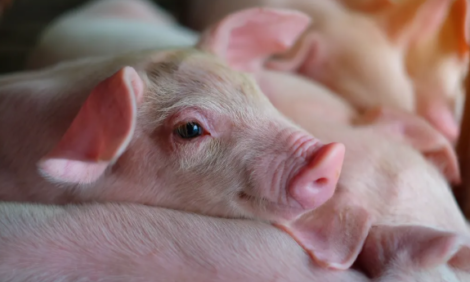



Effects of Low-, Medium- and High-Oil DDGS on Growth Performance, Nutrient Digestibility and Fat Quality in Finishing Pigs
Each one per cent of oil increased the Digestible Energy (DE) in Dried Distillers Grains with Solubles (DDGS) by 28kcal per pound, researchers told delegates at the 2013 Kansas Swine Day.
A total of 1,480 pigs were used in three experiments to determine the effects of DDGS varying in oil content on growth performance, carcass characteristics, carcass fat quality and nutrient digestibility in growing-finishing pigs, reported A.B. Graham and colleagues at Kansas State University.
In Experiment 1, 1,198 pigs (PIC 337 × 1050, initially 101.6lb) were used to evaluate the effects of corn DDGS with 5.4 or 9.6 per cent oil (as-fed). Pigs were allotted to a corn-soybean meal–based control diet or diets with 20 or 40 per cent of the two DDGS sources.
From days 0 to 82, average daily gain was unaffected by DDGS source or level. Increasing 5.4 per cent oil DDGS made the feed:gain ratio poorer (linear, P<0.01), whereas feed:gain ratio did not change for pigs fed 9.6 per cent oil DDGS.
Regardless of DDGS source, carcass yield and hot carcass weight decreased (linear, P<0.04) with increasing DDGS.
Increasing DDGS increased jowl iodine value but the magnitude was greater in pigs fed the 9.6 per cent oil DDGS compared with those fed 5.4 per cent oil DDGS (DDGS source × level interaction; P<0.01).
In Experiment 2, a total of 270 pigs (PIC 327 × 1050, initially 102.5lb) were allotted a corn-soybean meal–based control diet with 20 or 40 per cent of a 9.4 per cent oil or 12.1 per cent oil DDGS.
From days 0 to 75, average daily gain increased for pigs fed increasing 9.4 per cent oil DDGS but not for pigs fed 12.1 per cent oil DDGS (quadratic interaction, P<0.02).
Increasing DDGS increased (linear, P< 0.01) jowl iodine value and tended (linear, P<0.07) to improve feed:gain ratio.
Regardless of source, hot carcass weight and carcass yield decreased (linear, P<0.05) as DDGS increased.
In Experiment 3, nutrient digestibility of the four DDGS sources was determined using pigs fed either a corn-based basal diet or a DDGS diet with 50 per cent basal diet and 50 per cent DDGS.
On an as-fed basis, corn contained 1,756 and 1,594kcal per lb Gross Energy (GE) and DE, respectively.
The 5.4, 9.6, 9.4 and 12.1 per cent oil DDGS contained 1,972, 2,108, 2,142 and 2,224kcal per lb (as-fed) GE and 1,550, 1,674, 1,741 and 1,694kcal per lb DE, respectively (as-fed).
Step-wise regression indicated that the oil (ether extract) content was the only significant variable in explaining differences in energy content, and that a one per cent change in oil content will change the DE by 28kcal per lb (adjusted R2=0.41) and Net Energy by 52kcal per lb (adjusted R2=0.86; as-fed).
Reference
Graham A.B., R.D. Goodband, M.D. Tokach, S.S. Dritz, J.M. DeRouchey, S. Nitikanchana and J.J. Updike. 2013. Effects of low-, medium-, and high-oil dried distillers grains with solubles on growth performance, nutrient digestibility and fat quality in finishing pigs. Proceedings of 2013 Kansas Swine Day, p215-235.
Further Reading
You can view the full paper by clicking here.
Read other papers presented at the 2013 Kansas Swine Day by clicking here.
April 2014








